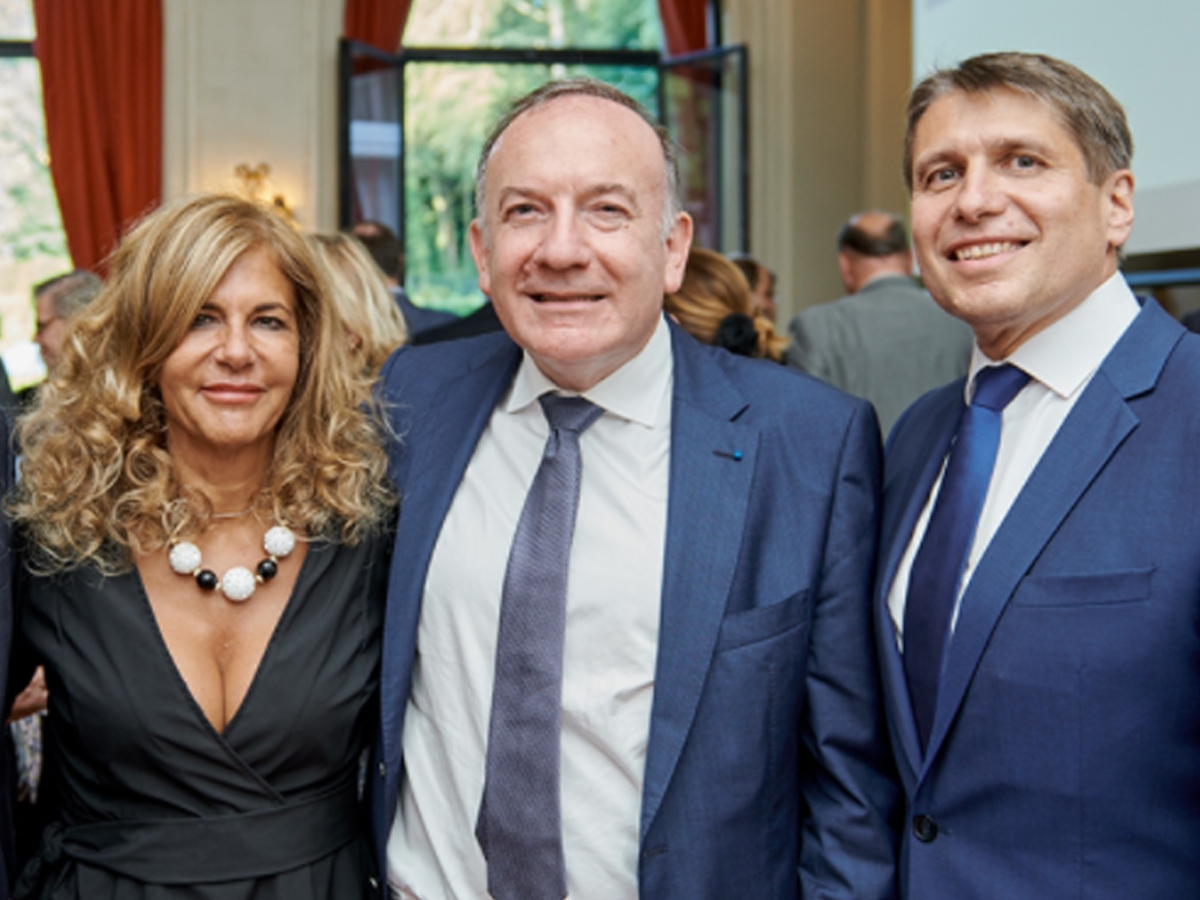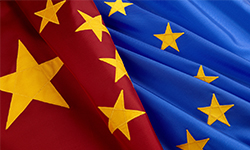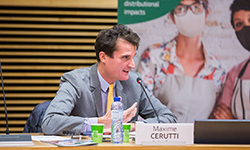BusinessEurope Headlines No. 2021-30
Business sends clear recommendations to G20

The B20 Summit that took place in Rome on 7 and 8 October, organised by the Confederation of Italian Industry (Confindustria), was an opportunity for the business community to pass clear and strong recommendations to governments on how to address current challenges and support the economic recovery. The role of companies will be critical to build more resilient supply chains, but also to develop technologies, goods and services that are needed to support decarbonisation and the digital transformation. The Summit also marked the end of the B20 Italian Presidency and the beginning of the B20 Indonesian Presidency. During a meeting with B20 Indonesia Chair Shinta Kamdani, BusinessEurope President Pierre Gattaz stated that European business is committed to cooperating with B20 Indonesia to build on the excellent work done by B20 Italy. “We also see this as an opportunity to develop relations with Indonesian business in the context of the ongoing trade negotiations between the EU and Indonesia. We see this trade agreement as critically important to increase the European presence and engagement in the Asia-Pacific region”, he said. The B20 is the official business platform to interact with G20 countries.
![]() Contact: Luisa Santos
Contact: Luisa Santos
Debate on the future of industry in a climate-neutral Europe
 “European business is committed to the climate ambition. We are convinced that beyond the need to tackle the long-term climate change crisis, this transition can also bring good business opportunities. At the same time, because of the magnitude of the efforts involved and the pace of the transformation implied, the accelerated transition is bound to have profound impacts on our economy”, said Markus J. Beyrer, Director General of BusinessEurope, at the World of Freight EXPO in Bratislava on 7 October. At the panel on the “Future of industry in a climate-neutral Europe”, panellists, including Michal Kiča, State secretary at the Slovakian Environment ministry, Miroslav Kiral-Varga, President of the National Union of Employers (NUE), and Radovan Kazda, Member of Parliament, discussed the challenges and opportunities linked to current European Commission’s initiatives, such as the Green Deal and the Fit for 55 package. In this context, Beyrer stressed: “The challenges are numerous, and many are short-term, for instance the impact on energy prices, risk of closures and carbon leakage, difficulties with labour reallocation, and a huge investments gap. If we don’t address them seriously, the green transition will come at the expense of our competitiveness”.
“European business is committed to the climate ambition. We are convinced that beyond the need to tackle the long-term climate change crisis, this transition can also bring good business opportunities. At the same time, because of the magnitude of the efforts involved and the pace of the transformation implied, the accelerated transition is bound to have profound impacts on our economy”, said Markus J. Beyrer, Director General of BusinessEurope, at the World of Freight EXPO in Bratislava on 7 October. At the panel on the “Future of industry in a climate-neutral Europe”, panellists, including Michal Kiča, State secretary at the Slovakian Environment ministry, Miroslav Kiral-Varga, President of the National Union of Employers (NUE), and Radovan Kazda, Member of Parliament, discussed the challenges and opportunities linked to current European Commission’s initiatives, such as the Green Deal and the Fit for 55 package. In this context, Beyrer stressed: “The challenges are numerous, and many are short-term, for instance the impact on energy prices, risk of closures and carbon leakage, difficulties with labour reallocation, and a huge investments gap. If we don’t address them seriously, the green transition will come at the expense of our competitiveness”.
Contact: Asdin El Habbassi
The EU and China need to keep an open dialogue
 “While the Chinese economy looks set to remain strong for decades to come, there are troubling signs that China is increasingly turning inwards. This tendency worries European companies in China”, said Jörg Wuttke, President of the European Union Chamber of Commerce in China (EUCCC), at a webinar co-hosted by his organisation, BusinessEurope and the EU-China Business Association on 12 October. At the event, Wuttke presented the 2021/2022 edition of the European Business in China Position Paper. The paper, which is published once per year, is a culmination of six months of dedicated work by 35 EUCCC working groups and sub-working groups. This year's edition looks into China’s 14th Five-Year Plan and identifies the areas of risk and opportunity, both for European business and China's economy. The event was moderated by Luisa Santos, Deputy Director General of BusinessEurope. “For European companies, it is key that the EU and China keep an open dialogue and work together constructively to resolve the current challenges”, Santos said in her concluding remarks.
“While the Chinese economy looks set to remain strong for decades to come, there are troubling signs that China is increasingly turning inwards. This tendency worries European companies in China”, said Jörg Wuttke, President of the European Union Chamber of Commerce in China (EUCCC), at a webinar co-hosted by his organisation, BusinessEurope and the EU-China Business Association on 12 October. At the event, Wuttke presented the 2021/2022 edition of the European Business in China Position Paper. The paper, which is published once per year, is a culmination of six months of dedicated work by 35 EUCCC working groups and sub-working groups. This year's edition looks into China’s 14th Five-Year Plan and identifies the areas of risk and opportunity, both for European business and China's economy. The event was moderated by Luisa Santos, Deputy Director General of BusinessEurope. “For European companies, it is key that the EU and China keep an open dialogue and work together constructively to resolve the current challenges”, Santos said in her concluding remarks.
![]() Contact: Benedikt Wiedenhofer
Contact: Benedikt Wiedenhofer
Employment is what matters to sustain social protection
 The European Commission’s Employment and Social Developments in Europe report is useful as it provides a good analytical basis to understand the employment and social aspects of the COVID crisis. However, today’s evolving situation needs to be taken into account and reflected in EU and national policy responses. We need to change the paradigm from a short-term response to the crisis, to a long-term agenda aiming to improve Europe’s capacity to create the conditions for long-term growth. On the employment front, increasing employment is what matters to sustain social protection systems. The recovery and resilience plans are a good opportunity to make a systemic step forward towards a better skills match between jobs demands and people’s skills. Moreover, one of the key findings of this crisis is that social partners’ role has been crucial for EU Member States to design the labour market and social response to the COVID crisis. Next year’s communication on social dialogue is an opportunity that should not be missed to improve social partners’ role in EU policy-making on active labour market policies and in the field of social protection. These were the key messages passed by Maxime Cerutti, Social Affairs Director, at the Commission’s conference “Towards a Strong Social Europe in the Aftermath of the COVID-19 Crisis: Reducing Disparities and Addressing Distributional Impacts” that was held on 12 October 2021.
The European Commission’s Employment and Social Developments in Europe report is useful as it provides a good analytical basis to understand the employment and social aspects of the COVID crisis. However, today’s evolving situation needs to be taken into account and reflected in EU and national policy responses. We need to change the paradigm from a short-term response to the crisis, to a long-term agenda aiming to improve Europe’s capacity to create the conditions for long-term growth. On the employment front, increasing employment is what matters to sustain social protection systems. The recovery and resilience plans are a good opportunity to make a systemic step forward towards a better skills match between jobs demands and people’s skills. Moreover, one of the key findings of this crisis is that social partners’ role has been crucial for EU Member States to design the labour market and social response to the COVID crisis. Next year’s communication on social dialogue is an opportunity that should not be missed to improve social partners’ role in EU policy-making on active labour market policies and in the field of social protection. These were the key messages passed by Maxime Cerutti, Social Affairs Director, at the Commission’s conference “Towards a Strong Social Europe in the Aftermath of the COVID-19 Crisis: Reducing Disparities and Addressing Distributional Impacts” that was held on 12 October 2021.
Contact: Maxime Cerutti
Improving working conditions mainly depends on improving productivity of work
 The world of work needs to adapt to digital and greening transitions. On digitalisation, the European social partners provided a key contribution with their 2020 autonomous agreement, which is currently being implemented across Europe. In the coming years, a key endeavour will be to set EU shared priorities for action by Member States to address the employment and skills dimensions of greening, and monitor progress as part of the European semester processes. BusinessEurope is looking forward to this debate. Social partners’ role will be important to make sure that the greening transition contributes positively to employment, and that people are supported to deal with changing skills demands. The necessary upskilling and reskilling of Europe’s workforce is an opportunity to structurally address skills mismatches and improve the productivity of work, thereby creating room for better working conditions. This is this virtuous circle that is needed on European labour markets. On top of this, given Europe’s demographic context, the Slovenian Presidency of the Council of the EU is right to consider ways to support people to stay longer in the workforce. This can be achieved by regularly updating skills, with a focus on increasing participation of older workers in training, notably to improve their digital skills. Pensions systems also need to be made fit for ageing across Europe. This includes the need for financial incentives aiming to encourage older workers to work longer. The availability of options for gradual retirement is also important. These were the key messages passed by Maxime Cerutti, Social Affairs Director, at the high-level conference “Quality Work for the Quality of Life”, organised by the Slovenian Presidency of the EU Council on 7 October 2021.
The world of work needs to adapt to digital and greening transitions. On digitalisation, the European social partners provided a key contribution with their 2020 autonomous agreement, which is currently being implemented across Europe. In the coming years, a key endeavour will be to set EU shared priorities for action by Member States to address the employment and skills dimensions of greening, and monitor progress as part of the European semester processes. BusinessEurope is looking forward to this debate. Social partners’ role will be important to make sure that the greening transition contributes positively to employment, and that people are supported to deal with changing skills demands. The necessary upskilling and reskilling of Europe’s workforce is an opportunity to structurally address skills mismatches and improve the productivity of work, thereby creating room for better working conditions. This is this virtuous circle that is needed on European labour markets. On top of this, given Europe’s demographic context, the Slovenian Presidency of the Council of the EU is right to consider ways to support people to stay longer in the workforce. This can be achieved by regularly updating skills, with a focus on increasing participation of older workers in training, notably to improve their digital skills. Pensions systems also need to be made fit for ageing across Europe. This includes the need for financial incentives aiming to encourage older workers to work longer. The availability of options for gradual retirement is also important. These were the key messages passed by Maxime Cerutti, Social Affairs Director, at the high-level conference “Quality Work for the Quality of Life”, organised by the Slovenian Presidency of the EU Council on 7 October 2021.
Contact: Maxime Cerutti
Speedy ratification and implementation of unitary patent system needed
 On 13 October, BusinessEurope, Eurochambres, SMEunited and Orgalim joined forces to call for wrapping up the remaining ratifications needed and to start the preparations for the provisional application of the Unitary Patent and Unified Patent Court. This tool is considered as one of the major breakthroughs of European Patent Law since decades. Key benefits include an overall reduction of financial and administrative burdens, increased legal certainty and facilitated enforcement of patent rights in the signatory countries.
On 13 October, BusinessEurope, Eurochambres, SMEunited and Orgalim joined forces to call for wrapping up the remaining ratifications needed and to start the preparations for the provisional application of the Unitary Patent and Unified Patent Court. This tool is considered as one of the major breakthroughs of European Patent Law since decades. Key benefits include an overall reduction of financial and administrative burdens, increased legal certainty and facilitated enforcement of patent rights in the signatory countries.
Contact: Pedro Oliveira
Exchange on works council and due diligence
 Any future European initiative imposing a mandatory due diligence duty in supply chains should be workable, provide legal certainty and ensure a true level playing field across the internal market. This message was voiced by Rebekah Smith, BusinessEurope’s Deputy Social affairs Director during the European Works Council conference, organised by the European Trade Union Confederation (ETUC) on 11 October, in a panel dedicated to human rights in supply chains. She added that workers are important stakeholders as they are part of the company and can be involved in discussions on due diligence within current EU and national legal frameworks. This already grants them an enhanced role compared to other stakeholders.
Any future European initiative imposing a mandatory due diligence duty in supply chains should be workable, provide legal certainty and ensure a true level playing field across the internal market. This message was voiced by Rebekah Smith, BusinessEurope’s Deputy Social affairs Director during the European Works Council conference, organised by the European Trade Union Confederation (ETUC) on 11 October, in a panel dedicated to human rights in supply chains. She added that workers are important stakeholders as they are part of the company and can be involved in discussions on due diligence within current EU and national legal frameworks. This already grants them an enhanced role compared to other stakeholders.
Contacts: Pedro Oliveira and Rebekah Smith
How to promote the ratification of the EU-Canada agreement
 “There is no silver bullet to promote the ratification of the Canada-EU Comprehensive Economic and Trade Agreement - CETA, it’s rather a recipe with multiple ingredients”, said BusinessEurope Deputy Director Eleonora Catella at the webinar “CETA four-year anniversary – High-level update and business roundtable”, organised in celebration of the 4th Anniversary of CETA, by BusinessEurope, the Canada EU Trade and Investment Association (CEUTIA), the Business Council of Canada, the European Services Forum (ESF), the European Chamber of Commerce in Canada (EUCCAN) and the Ireland Canada Business Association on 13 October. Catella pointed out that we need to further awareness of the opportunities opened up by the CETA among the European economic operators; and to ensure full implementation of the agreement to guarantee that glitches cannot give ammunition to those advocating against ratification. “We also need to focus on story-telling on the benefits of the agreement, bearing in mind that economic figures may not speak to many stakeholders and citizens who are rather interested in learning what CETA is doing to further sustainable development”, she added.
“There is no silver bullet to promote the ratification of the Canada-EU Comprehensive Economic and Trade Agreement - CETA, it’s rather a recipe with multiple ingredients”, said BusinessEurope Deputy Director Eleonora Catella at the webinar “CETA four-year anniversary – High-level update and business roundtable”, organised in celebration of the 4th Anniversary of CETA, by BusinessEurope, the Canada EU Trade and Investment Association (CEUTIA), the Business Council of Canada, the European Services Forum (ESF), the European Chamber of Commerce in Canada (EUCCAN) and the Ireland Canada Business Association on 13 October. Catella pointed out that we need to further awareness of the opportunities opened up by the CETA among the European economic operators; and to ensure full implementation of the agreement to guarantee that glitches cannot give ammunition to those advocating against ratification. “We also need to focus on story-telling on the benefits of the agreement, bearing in mind that economic figures may not speak to many stakeholders and citizens who are rather interested in learning what CETA is doing to further sustainable development”, she added.
Contact: Eleonora Catella
Business supports transition towards more sustainability, but at right conditions
 Business is in favour of actions to support and encourage companies in the transition towards more sustainability. However, at the end of the road, it is essential that all ongoing initiatives, from taxonomy, to Corporate Sustainability Reporting Directive and due diligence fit together, are SME-friendly, do not overlap and do not place European companies under unsustainable expectations and obligations. A cumulation of sustainability reporting on the shoulders of SMEs risks not only to limit their access to finance, but also to increase the cost of finance and to prevent from engaging on third markets. This was the core message of BusinessEurope Senior Adviser Daniele Olivieri during the SME Envoy Network online meeting on 5 October, which discussed, inter alia, the work of the Network for the next year.
Business is in favour of actions to support and encourage companies in the transition towards more sustainability. However, at the end of the road, it is essential that all ongoing initiatives, from taxonomy, to Corporate Sustainability Reporting Directive and due diligence fit together, are SME-friendly, do not overlap and do not place European companies under unsustainable expectations and obligations. A cumulation of sustainability reporting on the shoulders of SMEs risks not only to limit their access to finance, but also to increase the cost of finance and to prevent from engaging on third markets. This was the core message of BusinessEurope Senior Adviser Daniele Olivieri during the SME Envoy Network online meeting on 5 October, which discussed, inter alia, the work of the Network for the next year.
Contact: Daniele Olivieri
Discussion on economic developments with DG ECFIN Director Reinhard Felke
 On 7 October BusinessEurope’s Economic and Financial Affairs (ECFIN) committee welcomed Reinhard Felke, Director for Policy Coordination, Economic Forecasts, and Communication at the European Commission Directorate-General ECFIN, for an informal discussion around current economic developments in the EU economy, including the ongoing work to finalise and implement national recovery and resilience plans. The members of Businesseurope's ECFIN committee emphasised the importance of a thorough implementation of the national recovery and resilience plans, with a focus on ambitious, employment and productivity enhancing reforms.
On 7 October BusinessEurope’s Economic and Financial Affairs (ECFIN) committee welcomed Reinhard Felke, Director for Policy Coordination, Economic Forecasts, and Communication at the European Commission Directorate-General ECFIN, for an informal discussion around current economic developments in the EU economy, including the ongoing work to finalise and implement national recovery and resilience plans. The members of Businesseurope's ECFIN committee emphasised the importance of a thorough implementation of the national recovery and resilience plans, with a focus on ambitious, employment and productivity enhancing reforms.
Contact: Malthe Munkøe
Calendar 
- 20-22 October: European Forum for New Ideas 2021
- 23 October: 5th EU-GCC Business Forum
- 25-29 October: EU Sustainable Energy Week
- 31 October - 12 November: United Nations Climate Change Conference (COP26)
Not yet a subscriber? Register here.
Reminder: please have a look at our privacy policy